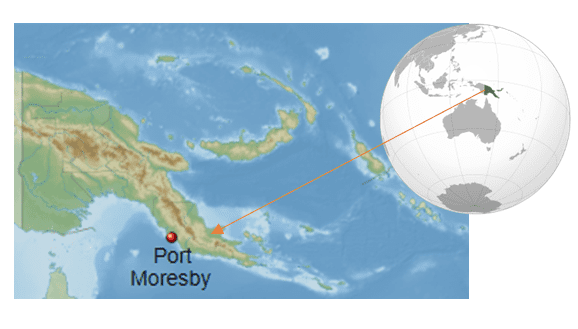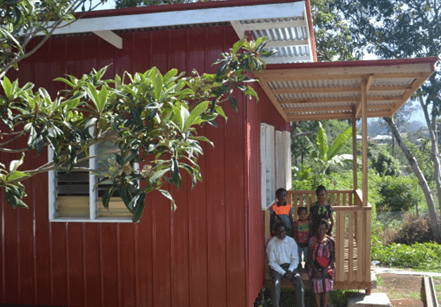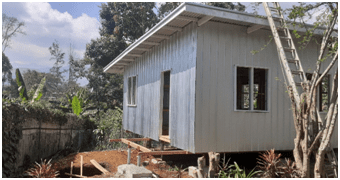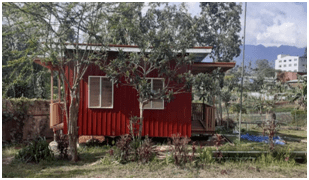Papua New Guinea (PNG) is the largest country of the Melanesian Region in the South Pacific and ranks among the most culturally diverse worldwide, home to approximately 8.8 million people and 840+ ethno-linguistic groups (World Bank 2019).
PNG remains close to the bottom of the global Human Development Index, ranked 155th out of 189 countries (UNDP HDI Report, 2020), with 38% of the population living below the poverty line of $1.90 per day.

The country’s economic and social reality is becoming increasingly disrupted by the effects of climate change. Currently the region is vulnerable to events such as tropical storms, drought, and extreme rainfall (caused by cyclones and tsunamis); and in future, there will be mass migration and loss of life due to the rise in sea level. [i]
The country is already seeing rising sea levels and devastating king tides that wipe out crops, inundate water sources and destroy homes. In fact, residents of Carteret Islands, Papua New Guinea’s six low-lying atolls are already seeing sea level rise that is threatening the very existence of their homes.[ii]
Communities throughout Papua New Guinea’s coastline will face similar threats in future as they confront the consequences of intense weather events and sea level rise. [iii]
The Vincentian International Mission Team (CM-PNG) recognizes that the lives of the poor will continue to deteriorate as climate change intensifies. The island will also continue to see an influx of refugees in need of housing and work. This has led to the development of a pilot Socialized Housing initiative, which aims to address homelessness as a cross-cutting development agenda that affects the very poor.
As part of the 13 Houses Campaign, the project does not only involve building houses but more importantly it also supports the social process of building inclusive and sustainable communities among people living in poverty. The housing process promotes social inclusion and accountability for the most vulnerable groups in PNG/ Melanesian contexts. Each plot of land will contain a two-bedroom home with an indoor toilet and a garden to support a traditional integrated farming system.
The Vincentian Solidarity Office (VSO) and the Famvin Homeless Alliance (FHA) are supporting the CM-PNG in pioneering a ‘Melanesian Solidarity Village’ (MSV): they have now completed the first phase of the project by building a model house that will serve as a prototype for future houses.
The first one has recently been completed, and a family of refugees have already moved into the house. They secured stable, modern housing for the first time since 1984.
Mr. Kamim and his wife are from the Muyu tribe in West Papua in Indonesia. The couple have eight children (and now eight grandchildren), who were all displaced and moved into the Western Province of Papua New Guinea as refugees.
Since he arrived in PNG Mr. Kamimhas continued to work with Catholic missionaries in the refugee camp in Daru-Kiunga, Western Province of Papua New Guinea. He devoted his time to educate refugee children about reading and writing using different languages. Recognizing his talents and commitment in educating the young generation of the Muyu tribe in a foreign land, the UNHCR sponsored Mr. Kamim to earn a diploma in primary education from Divine Word University -St. Benedictine Teacher College. Three of Mr. Kamim’s daughters followed his footsteps and became teachers. Mr. Kamimhas now finally retired from his noble profession, giving him the opportunity to finally settle with his wife and grandchildren in stable housing.

The Kamim Family sitting on the veranda of their completed model house
The Vincentian International Mission Team (CM-PNG) are leading the pilot project, and they are being assisted by the Melanesian Institute for Socio-Pastoral Services (MI) in the technical, social processes, negotiation, and networking aspects. The project will also involve the Daughters of Charity (DC), who are also expatriate missionaries, in areas where their professional skills and experiences could be optimized, including pastoral education and social services. The various Vincentian lay organizations such as the Society of St. Vincent de Paul (SSVP) and the Vincentian Marian Youth (VYM), which continue to grow in the parish and school settings will work together to strengthen the sense of community. Lay members with professional background or relevant skills will likewise be engaged for particular aspects of the project. The incremental growth of the Melanesian Solidarity Village (MSV) will gradually give rise to a ‘Vincentian Housing Network’ in PNG.

House during the constructionbefore the veranda was installed

Completed house (side view)
The Village will see the construction of 50 houses and take three years. The aim of the project is not just about building houses, but more importantly the social process of creating and strengthening communities amongst those who are the most vulnerable and living in poverty, to make sure they are not ‘forgotten’ but can get the help they need through a ‘network of charity’.
We are grateful to see that the first house has now been completed and we are looking forward to seeing how the project develops in the future. We are sure this initiative will help many more people in need to exit the cycle of poverty and that thanks to the strength of the community the families will receive the help they need to attain the right to a dignified life.
On this note, we would like to share with you a quote from St Vincent de Paul that well reflects the strength of the community: ‘Charity is the cement which binds Communities to God and persons to one another’
As followers of Saint Vincent, let us help the people who are experiencing homelessness to access a dignified future. Join us!
One home at a time!
Thanks for sharing. Good day.
A great initiative in such a much needed area.